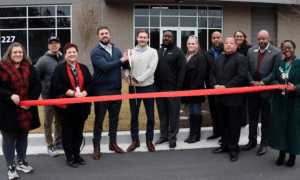There was no official statement from any member of the Fayette County Board of Commissioners at the Jan. 8 meeting regarding the recent developments in the district voting case, which an appellate court recently sent back here for trial, but several citizens made their opinions known during the public comment portion of the meeting.
Three speakers urged the board to stop pursuing the case, while one expressed his displeasure at how the new district voting setup has affected his voting rights.
Terrence Williamson said that while both sides could argue victory, continuing the fight is not a good idea from the county’s standpoint.
“I’m not a lawyer, but it seems clear that the panel of three judges said there was a clear basis behind the lawsuit. It was remanded back for a bench trial solely on a technicality,” he said.
“I would urge the commission to take a deeper look and spend our money wisely. There are a lot of things we need to pay for, and continuing to waste it on this is not the right decision.”
Virgil Fludd, one of Fayette County’s state legislators, began his remarks by referring to the recent election of Pota Coston to the board, a result that many attribute directly to the new voting districts.
“I’m here to participate in what I feel is a monumental meeting — the first meeting in which we have an African-American citizen on the Board of Commissioners,” said the Democratic state representative from District 64.
Fludd went on to ask the commissioners not to make any further appeals in the court case.
“Obviously this has been a bone of contention for a number of years. It’s been, quite frankly, very divisive,” he said. “I think it would be in the best interests of the commission and the residents of Fayette County for there to be no further action.”
Larry Younginer told the board that while change is difficult, it is necessary and it happens. He went on to cite statistics regarding the recent U.S. Senate elections across the country, saying that 20 million more Democratic votes were cast for candidates who won those elections than for Republicans.
“The reason the Republicans have the majority in the U.S. Senate is that each state elected its own senators. They weren’t elected on a national basis,” he said. “Group elections do not work for the people. It doesn’t work at the national level, the state level or the county level.”
He then noted Coston’s presence on the board as a perfect example, saying that in the past it has always been made up of white men.
“Now we can have what we voted for — an election that supports us,” he said. “We don’t have to vote for a black person just because we have a fifth district; we can vote for a good person. But when we were muddled in with everybody else, we had no opportunity to elect the person we wanted to represent us. We do that now. I beg you, don’t step back.”
Mike Coley did not share his fellow citizens’ opinion on the issue.
“I was dismayed to find out that there was going to be a change whereby four-fifths of my voting rights were going to be taken away,” he said of when he first learned about it.
Calling Fayette “a conservative county,” Coley referred more than once to the “NAACLP,” saying that an organization known for fighting discrimination at all levels has become “an extension of the Democratic Party, and today it uses race to implement the Democratic Party agenda.”
He stressed that for him the matter was not about race, but about politics, specifically the kind of liberal thinking he and others in his communities moved to Fayette from other counties to get away from.
He encouraged the board to continue its efforts to correct what he sees as a wrong approach to the voting issue.
“As a resident and voter in Fayette County who has had four-fifths of his voting rights taken away, I want to thank the board for continuing to pursue equal representation for all Fayette County residents.”
The only commissioner who referred to the issue in any way was Steve Brown, who mentioned it during his designated comment time near the end of the meeting.
Brown stressed that for him the lawsuit was never about Coston personally. “I hold her in the highest esteem, and we are glad to have her on board,” he said.
The former chairman said that he “literally had to fight” to get Coston on the ethics board during his first two years as a commissioner, and he made a point of seeking out qualified black candidates for all of the county’s boards, commissions and authorities.
“We found the highest caliber of people that we could possibly find in this county,” said Brown. “Now I can happily say that the entire ethics board is African-American, the first time that has ever happened on any board, authority or commission in the history of Fayette County.”
The U.S. Court of Appeals for the Eleventh Circuit ruled that the district court judge made a mistake in granting summary judgment in favor of the NAACP and against the county and the school board in the lawsuit alleging racial discrimination under the federal Voting Rights Act.
According to a statement from the county’s attorneys in the case, the Eleventh Circuit found that the trial court should have held a trial instead of granting summary judgment to the NAACP. The court also found that summary judgment should not have been granted against the Board of Education because the NAACP never asked for summary judgment against those defendants.
The appeal win means that the county and the school board can present their cases again in favor of at-large voting in a bench trial, in which the judge will make a ruling without a jury.
The appeals ruling does not overturn the district voting scheme approved by the court, nor does it affect the outcome of last November’s general election.
Voting lawsuit legal expenses mount up: $743,000 so far
Legal expenses paid by the Fayette County Board of Education and the Fayette County Board of Commissioners over the federal district voting lawsuit brought by the Ga. State Conference of the NAACP (National Association for the Advancement of Colored People)total more than $743,000 to date.
According to school system records the school board’s total cost to date is nearly $309,000. A breakdown of the costs shows:
• Harben, Hartley and Hawkins — $34,704.95
• Parks, Chesin and Walbert — $234,152.97
• Risk Management Fund coverage — $40,000.
School system Assistant Superintendent Tom Gray said Harben, Hartley and Hawkins is the law firm that is used as legal counsel for the school district. They have represented the school district since the onset of the lawsuit. Payments to them represent payment for services in relation to the lawsuit less amounts covered by the system’s risk management fund (RMF, similar to insurance coverage) with the Ga. School Boards Association.
The coverage for the district includes a $10,000 deductible and a $50,000 maximum per case. Therefore, GSBA paid $40,000 to Harben, Hartley and Hawkins on behalf of the school district, said Gray.
Gray said Parks, Chesin and Walbert were retained as special legal counsel for the NAACP case on May 1, 2014. The fees paid to them represent payments for their services related to the case. They are legal counsel representing the school district versus the NAACP lawsuit going forward.
The Fayette County Board of Commissioners to date is looking at legal expenses totaling more than $434,000 in the federal district voting court case.
The commission on Dec. 12 released a statement saying that the county had recently received up-to-date billing statements from the attorneys hired to represent the county government in the NAACP district voting lawsuit.
The latest statements in the district voting case bring the legal account current with the firm of Strickland, Brockington and Lewis, LLP. Counsel has billed the county $434,155 in fees and expenses over the three and a half years of the case, said Fayette County Chief Deputy Clerk Tameca White.
White said there may be future legal fees related to the appeal currently before the Eleventh Circuit U.S. Court of Appeals said.
As of April 28, 2014 the NAACP lawyers have incurred fees and expenses of $787,882, White said.
The appeal of a federal court decision mandating district voting in Fayette County was heard Dec. 10 at the U.S. 11th Circuit Court of Appeals in Atlanta.
It is currently unknown what posture either side of the lawsuit might take now that the appeal is decided.
— Lawsuit legal expenses story written and reported by BEN NELMS.











Leave a Comment
You must be logged in to post a comment.